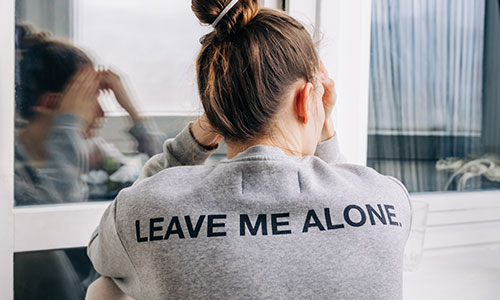BPD Comorbidities: Conditions That Can Co-Occur with Borderline Personality Disorder
29th July 2021
Dating someone with BPD presents a unique set of challenges.
But the piece that can often make a BPD relationship so difficult isn’t necessarily the presence of the condition itself, but the lack of awareness of it on both sides.
This can lead to a never-ending cycle of push and pull between the partner with BPD and the one without, unable to break the circular dance of dysfunction.
But it doesn’t have to be that way.
Here’s what it looks like to date someone with BPD, so you can make more informed and compassionate decisions about your relationship.
Understanding BPD: A Prelude to Dating Someone with BPD
Borderline personality disorder (BPD) relates to the way an individual perceives themselves and others in their life. It can make both forming and maintaining relationships especially challenging and fraught with difficulty.
Emotional instability is at the very core of any diagnosis of BPD, which is often rooted in abandonment wounding. This can lead to an extreme sense of insecurity, not just in platonic relationships, but also in romantic connections, as well.
This feeds into the cognitive and perceptual distortions, which then inform impulsive patterns of behaviour. These patterns of behaviour exist on a sliding scale of intensity and may include things such as binge eating, substance abuse, suicidal ideation and self-harm.
How BPD Can Impact Relationships
So, what does dating someone with BPD actually look like? And how does BPD affect relationships? Despite the potential for moments of extreme difficulty, it’s not all chaos all the time. Much like the personality of the individual who has BPD, the relationship will oscillate between periods of ideation and devaluation.
Unless there is an awareness of the condition – and sometimes this can happen regardless – the tempo of the relationship will be set by the mood and temperament of the borderline partner. It’s almost like a pendulum being swung back and forth. But if there is to be a successful relationship that comes from dating someone with BPD, this cannot be the case long-term
For example, one day the person you’re dating might feel like they’re on top of the world and the next day, they might be questioning their entire existence, embroiled in a deep existential crisis. At times, this can lead to a greater emphasis being placed on the needs of the BPD partner with them requiring more emotional support to avert crisis.
This can create a dynamic where the non-BPD partner is in a state of constant reactivity, trying to appease their partner in a sense of damage limitation. As a result, it can lead to an extremely unbalanced relationship where people-pleasing overrides the sense of genuine love and affection. It becomes a relationship with the disorder rather than the human being.
5 Telltale Signs You’re Dating Someone with BPD
Awareness is key when dating someone with BPD. Even if there has been self-disclosure, there still needs to be an understanding of how the symptoms might show up and affect any potential relationship.
Here are five signs you might be dating someone with BPD.
Emotional Instability: The Rollercoaster Ride
Examples of emotional instability may include:
- The person you’re dating may become elated over small achievements only to then spiral into despair after a trivial setback.
- You might experience 180° turns in conversation with your partner reacting in an aggressive way to your comments they interpret as unacceptable.
- Your partner may exhibit severe anxiety or depression out of the blue, making you feel like you’re walking on eggshells.
- A casual date might turn into a dramatic exchange with your partner oscillating between affection and emotional distance.
Frantic Efforts to Avoid Abandonment
The fear of abandonment might manifest in the following ways:
- Minor miscommunications such as a delayed response to a text might lead to an accusation of neglect from the BPD partner.
- The BPD partner may require frequent reassurance about your commitments to them, and interpret any reluctance as disinterest.
- Your partner may become upset if you spend time with friends or engage in activities without them, interpreting it as abandonment.
- They might become clingy or demanding, constantly seeking validation of your commitment to them.
Black and White Thinking
Black and white thinking, which is also known as splitting may present in the following ways:
- Your partner may idolise you, treating you as the love of their life and then devalue you in the next instance over a minor disagreement.
- They might categorise people or situations as either “all good” or “all bad,” with little room to see the nuances in between.
- They might have difficulty acknowledging they have mixed feelings about someone or something. They either love it or hate it.
- Reactions to mistakes or failures could be extreme, viewing them as catastrophic failures rather than opportunities for growth.
Impulsive Behaviours
Examples of impulsive behaviours include:
- Your partner might make rash decisions such as quitting their job out of the blue or booking a last minute trip without considering the consequences.
- They might struggle to manage their money, going on impulsive shopping sprees and making big purchases they can’t afford.
- They might engage in risky physical behaviour such as reckless driving or casual sexual encounters (cheating).
- There might be instances of compulsive behaviours such as substance abuse, excessive drinking, binge eating, excessive exercising and dieting
Self-Destructive Actions
Self-destructive actions might appear as:
- Your partner may express frequent thoughts about ‘not wanting to be here,’ death or suicide. This is a cry for help and should be addressed with the help of a professional.
- They might resort to self-harm, like cutting or burning themselves as a way of dealing with the overwhelming emotional pain.
- There may be impulsive suicide attempts or threats in response to their real or imagined fear of abandonment.
- They might frequently engage in dangerous activities showing a complete disregard for their safety.
4 Unexpected Benefits of Dating Someone with BPD
Although dating someone with BPD might appear to be an outwardly challenging experience, there are some unique benefits. And while every person with BPD is different, there are certain qualities common amongst most diagnoses, that when harnessed, or reframed in a different perspective, can add richness and depth to the relationship.
1. The Intensity of Emotion: A Unique Experience
The intensity of love when dating someone with BPD can be felt in many different ways that include:
- They have a passionate all-consuming love that makes you feel like nothing else.
- The amplification of joyful moments through unbound enthusiasm.
- Receiving grand gestures born out of their intense love for you.
- Contagious passion that could spark interest in new hobbies and/or experiences.
2. Emotional Honesty: Cutting Through the Pretence
Emotional honesty can sometimes be difficult to receive, as it may challenge the status quo of a relationship, but it can also lead to moments of genuine growth and love.
Here’s what it might look like:
- Your partner will express their emotions freely and without pretence.
- Their openness and vulnerability can provide you with permission to do the same.
- They’re able to share difficult and hard truths about the nature of the connection.
- Their emotional honesty can bring about deep and meaningful conversations.
3. Empathy: A Deep Understanding of Others
The empathic capacities of someone with BPD can make them extremely adept at understanding those closest to them:
- They might have an uncanny ability to know your emotional state even if you’ve expressed it poorly.
- Their experience of emotional dysregulation can make it easier to understand yours.
- They can be incredibly caring and compassionate in times of need.
- Their empathy can create a sense of real shared understanding in the dynamic.
4. Spontaneity: Keeping Things Fresh and Exciting
The spontaneity of dating someone with BPD can also keep a relationship fresh and exciting:
- They might surprise you with a spontaneous trip or a unique idea for a date, keeping the relationship interesting.
- The impulsivity can make it feel like an adventure where you never know what’s going to happen next.
- They might teach you how to embrace surrendering and living in the now.
- They are likely to value novelty and new experiences which can make trying new things easier.
Dating Someone with BPD and Bipolar Disorder
Something which is uncommon, but can be an occurrence in BPD is a dual diagnosis with Bipolar. Roughly 20% of those diagnosed with BPD also have a diagnosis of bipolar II, while 10% may also have underlying symptoms of bipolar I. Understanding this is a potential factor when dating someone with BPD is also something to bear in mind.
BPD and Bipolar: Understanding the Dual Diagnosis
If you do find yourself dating someone with both BPD and bipolar, It’s important to understand these are two separate conditions that have overlapping symptoms, particularly in regards to mood instability.
When there is a dual diagnosis of both BPD and bipolar, there can be an amplification In the intensity of the symptoms. For example, the mood instability that is common in both disorders can become extremely pronounced.
Also, the chronic feelings of emptiness, further abandonment and unstable sense of self common to the BPD can also contribute to much deeper depressive episodes that are a result of the bipolar symptom set.
Finally, the impulsivity and tendency towards risk-taking behaviours associated with the manic episodes of bipolar, can also exacerbate the same tendencies in BPD and vice versa.
These are just a few instances of how the two symptom sets might interplay with each other.
Similarities between BPD and Bipolar Disorder
Mood Swings: Both BPD and bipolar to result in mood swings from depression to euphoria
Impulsivity: Both disorders can involve impulsive and/or risky behaviours.
Suicidal behaviours or Thoughts: Individuals with either BPD or bipolar may struggle with suicidal ideation and/or suicide attempts.
Unstable Relationships: Both BPD and bipolar can result in difficulties maintaining healthy relationships.
Fear of Abandonment: Although abandonment is more common in BPD, they can also present in cases of bipolar, especially during depressive episodes.
Unique Symptoms of BPD:
Chronic Feelings of Emptiness: There may be a persistent sense of emptiness or boredom.
Intense Fear of Abandonment: There may be an intense fear of being left alone to the point of feeling intensely distressed.
Identity Disturbance: There may be an unstable or shifting sense of self-image.
Paranoid Thoughts: There may be stress-related paranoid thoughts or dissociative symptoms.
Unique Symptoms of Bipolar Disorder:
Manic or Hypomanic Episodes: Periods of extremely elevated mood, energy, and unusual activity levels. This may include racing thoughts, talking fast, little need for sleep, and grandiosity.
Major Depressive Episodes: Prolonged periods of extreme depression characterised by a severe lack of energy, difficulty in concentration, sleeping too much or too little, and feeling hopeless or worthless.
Psychotic Symptoms: During severe episodes, either manic or depressive individuals may experience hallucinations or delusions.
Distinct Periods of Illness: In contrast to the chronic nature of BPD symptoms, bipolar symptoms tend to occur in distinct episodes.
Advice on Dating Someone with BPD: Strategies for a Healthier Relationship
Now, after exploring both the challenges and benefits of dating someone with BPD, you might now be asking, “How do I make this work?”
5 Tips on Dating Someone with BPD
Here are five key areas to focus on within the context of dating someone with BPD.
1. Patience: The Virtue That Goes A Long Way
Due to the impulsivity and volatility of the BPD relationship, patience will go a long way. Although, do bear in mind, your partner isn’t acting in the way they are to intentionally hurt you. The way they present and attempt to fulfil their needs is a result of continuously intense internal and emotional struggle.
2. Communication: The Foundation of Understanding
All healthy relationships require open and honest communication. And this is especially true when dating someone with BPD. Creating a safe space where you can both express your thoughts and feelings about fear of judgement will help create a mutual understanding and a place where you can resolve issues in a constructive manner.
3. Boundaries: The Lifeline of Balance
Boundary violations can also be a big issue when dating someone with BPD. This is due to the intense fear of abandonment which can lead to clinginess and dependency. Setting firm but fair boundaries at the beginning of the relationship is not only for your own sake but for the sake of any relationship you wish to build.
4. Encourage Treatment: The Path Towards Better Health
Encouraging treatment shouldn’t be the first thing you do when dating someone with BPD as this may overstep some very sensitive boundaries. But if you are in a long-term relationship with someone, you may reach the point where you are able to have this conversation constructively. In this case, therapies like dialectal behavioural therapy (DBT) and cognitive behavioural therapy (CBT) are both highly respected evidence-based approaches.
5. Self-Care: Don’t Forget About You
Something that’s also easy when dating someone with BPD is forgetting about your own needs. The remedy to this is making the time in space for regular self-care. Doing things just for you that make you feel good – whatever they may be. It’s important to fill your own cup as well as that of your partner’s.
Trauma from Dating Someone with BPD
Due to the tumultuous nature of dating someone with BPD, it only feels right to mention that it can result in emotional trauma for the non-BPD partner. This isn’t true of every single BPD relationship. But it is a common enough occurrence that it’s worth bearing in mind, so you can check-in and see where you might be stretched beyond your normal capacity.
PTSD from Dating Someone with BPD: Recognising and Handling the Impact
It’s more common for people to associate Post-Traumatic Stress Disorder (PTSD) with experiences such as war or severe accidents-acute trauma. But trauma can also come from intense and volatile relationships. This is, after all, one of the main drivers of BPD itself. If you’ve found yourself persistently anxious, easily startled and/or are having flashbacks to your relationship, these are all signs that you might be experiencing symptoms of PTSD.
How to Recover from Dating Someone with BPD
Recovery doesn’t happen overnight, but it is absolutely possible. Here are some strategies that can help you in your healing journey.
Prioritise Self-Care: If you suffered trauma as a result of a BPD relationship is likely a part of this may have been ignoring your needs in favour of prioritising your partners’.
- Eat a balanced diet including foods that nourish your body
- Ensure you get enough good quality sleep every night
- Make sure you get regular exercise and/or move your body
- Engage in activities that help you relax and bring you joy.
Seek Professional Help: If there is severe trauma involved, therapeutic intervention can be a great aid in the healing process. Here are some avenues to consider:
- Individual therapy can provide a safe space for emotional expression, learning coping strategies, and promoting healing.
- Support groups offer a sense of community, reduce feelings of isolation, and provide practical advice.
Understand Recovery Is a Process: Healing isn’t a one-time event. It requires self compassion and acceptance of one’s circumstances. Remember, recovery often isn’t linear.
Acknowledge Your Feelings: It’s okay to not feel like your best. Accept yourself fully. The more you push those parts of yourself away, the greater distance you create between recovery.
Don’t Hesitate to Ask for Help: Asking for support does not indicate weakness. There’s great strength in having the vulnerability to be able to ask for help, whether it be through friends, family, or a mental health professional.
Remember, the journey of recovery Is unique to each individual, And what works for one person may not work for another. If you do require support, understand your own needs, what you’ve experienced and what that support might look like for you.















